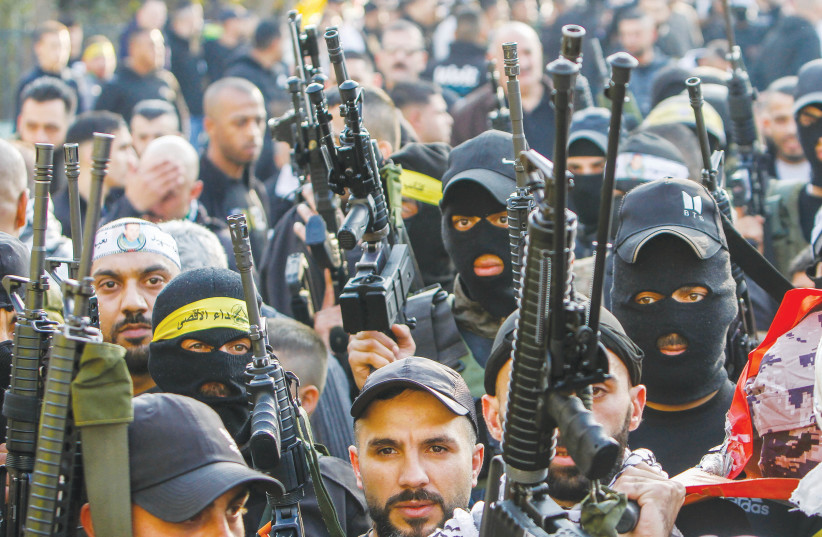‘The world cannot remain indifferent to the Iranian regime’s call to wipe Israel off the map”, said President Issac Herzog this week to the US Congress. Indeed, Iran has become all too comfortable recently in our neighborhood. This may be acceptable, specifically in the West Bank, in which a much-weakened Fatah leadership is quickly losing ground to the Iranian-backed Hamas and the Islamic Jihad.
In fact, during the recent visit of Palestinian President Mahmoud Abbas to the Jenin refugee camp, following Israeli Operation Bayit Vagan, he was greeted with one repetitive word: katiba (militia). This implied that the real strength in the camp belonged to the aforementioned Iranian-backed gangs, which are trained, funded, encouraged, and incited by Tehran to defy the current Palestinian leadership and Israel’s existence.
Iran in the West Bank, preparing the ground after Abbas visit
Iran has been highly diligent in preparing the ground after the visit by Abbas to the West Bank. It has also been very careful to turn the political havoc currently characterizing the internal arena in Israel to its own advantage.
First, it has not taken for granted its iron grip on the Lebanese and the Syrian arenas – both deeply immersed in chaos, economic disintegration, instability, and despair. In recent months, Iran went to great lengths to strengthen its grip and embolden its proxies to perform unusually arrogant acts which breach Israel’s sovereignty.

A member of Hezbollah performed an act of terror near the Megiddo junction, within Israel’s undisputed borders, as a clear act of casus belli (provocation) several months ago. Despite the fact that the terrorist was stopped before a disaster could ensue, the fact that he had reached that far within Israeli territory was a clear attempt to test the boundaries of Israeli responses and readiness.
In the last few weeks, Hezbollah, encouraged by Iran, set up two tents on the Israeli side of the fence thereby bluntly disregarding Israeli sovereignty. Declaratively, Hezbollah claimed that it would not remove the tents until the formerly disputed area of Ghajar, a village which straddles the border between Lebanon and the Israeli Golan was evacuated and returned to Lebanon. Only forgetting that the Alawite-Arab inhabitants of the village have little interest in becoming Lebanese, certainly under the auspices of Hezbollah and would prefer to hold onto Israeli citizenship.
This is clearly yet another attempt by Hezbollah, or in other words, Iran, to try and leverage the internal political chaos in Israel, which it mistakenly interprets as military weakness for its own purposes.
Iran has not rested
BUT TEHRAN has not rested with challenging Israel’s northern borders. It has been very active in the West Bank, creating what appears to be near hysteria amid the Fatah leadership. Bored and unemployed Palestinian youth are fed unabated incitement in schoolbooks, and given the opportunity to participate in Hamas and Islamic Jihad-funded summer camps and extra curriculum activities, through which they become empowered through military training.
Two more arenas serve as Iran’s playgrounds, although they are not yet as blunt or as public. The first is Jordan, where there is a huge influx of Iranian activity. This, coupled with the weakness of the Jordanian leadership and the poor economic situation in a country which still hosts hundreds of thousands of Syrian refugees, is a recipe for chaos and instability. Given the fragility and strategic importance of this tiny country bordering Israel, and serving as a base for American military presence, this is an extremely concerning situation.
Furthermore, the Iranians are working extremely hard to infiltrate the internal Israeli Arab society and incite its Sunni youth with anti-Israeli sentiment and a Shi’ite zeal for holy war. This is done much to the chagrin of Sunni Sheikhs in the Arab cities throughout the country, including in the very birthplace of Jesus, the city of Nazareth.
It is clear that the Iranian zeal for exporting its influence and impact on the region is being cleverly and patiently executed on multiple levels and in multiple arenas. This should be an absolute red flag for all countries in the region, including the Abraham Accords’ countries, and of course, the US and Europe, who seek regional stability for the sake of commerce, technological development, and trade.
The writer is the founder and CEO of Ruth-Strategic Consulting, a former MK for the National Unity Party, a former deputy ambassador to Cairo, and a past adviser to President Shimon Peres.
